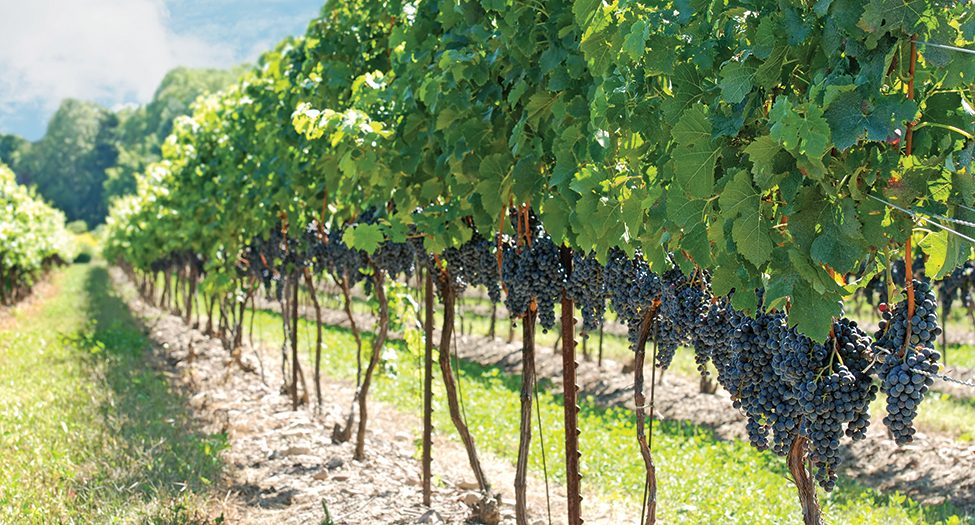
Home » Juicy fruit: State dominates U.S. for Concords
Juicy fruit: State dominates U.S. for Concords

June 12, 2019
By Andy Perdue
While the Washington wine grape market booms, even approaching the state apple industry in size and economic importance, there’s another grape industry that tops the nation in size: juice grapes.
Last year, Concord grape growers brought
in nearly 200,000 tons of fruit — 3 percent over the prior year, valued at
$41.8 million.
Though the industry got its start on the
East Coast — the original Concord grape was developed in Massachusetts in the
mid-1840s — and while states such as New York, Michigan and Pennsylvania are large growers, Washington
has long been the nation’s No. 1 grower, with the Yakima Valley and Burbank
areas in Walla Walla County being favorite areas for growers.
Concords in Washington date back at least
a century, first planted near Outlook, in 1904. Through the years, they’ve been
used to make juice, jelly, candy – even wine. Concords were the first grapes in
Washington that were mechanically harvested in 1968.
The Concord gets its
name from the town of Concord, Massachusetts, where Ephraim Bull propagated the
original vine after selecting a single vine from the 22,000 he planted. It was
developed from wild vines growing in North America and was brought to market in
the 1860s by Thomas Welch. After it was pasteurized, it wouldn’t ferment, so it
was used for church communion services.
Bull’s original Concord vine is alive and
well at his home in Concord, still producing grapes each season.
Washington tends to lead the way, not only
in quantity but in quality. The reasons for this are myriad, but it comes down
to
the same reason Eastern Washington’s Columbia Valley produces world-class wine
grapes: climate and irrigation.
Well-draining sandy soils and scant
precipitation mean farmers apply water through irrigation, giving them control
over the plants and their vigor. Also important is the perpetually blue skies
that help the plants convert sunshine into sugar.
In the grape juice game, it’s all about
sweetness.
Typically, Concord growers aim for grapes
that are around 15 percent sugar, said Dick Boushey, a grower north of
Grandview who also is on Welch’s board of directors.
For grapes to make red wine, the target
often is 24 percent sugar.
Boushey, more famous as one of
Washington’s top wine grape growers, planted Concords along County Line Road in
1980. He now farms about 90 acres of juice grapes, along with 220 acres of his
own wine grapes and an additional 300 acres he manages for others, primarily on
Red Mountain.
The mix works well for Boushey, primarily
because he can use the same crews and the same farming equipment for juice and
wine grape varieties.
Concords are a heavily mechanized crop.
Today, everything from pruning to harvesting is done by machines, helping to
make the crop less labor dependent and more profitable.
According to the U.S. Department of
Agriculture, Washington produces more than half the nation’s half-million tons
of Concords annually.
Concords are hearty vines, meaning they can withstand Washington’s occasionally harsh winters with little to no damage.
Boushey said the only year he saw damage
was in the late 1970s, when severe cold caused widespread damage to the
relatively tender wine grapevines.
Farming Concords vs. wine grapes is quite
different. Wine grapes typically are grown at low tonnage. Winemakers like
their tonnage low, often as low as two tons of fruit per acre.
Concords, meanwhile, can be grown at
upward of 10 tons per acre, harvested when the fruit reaches the desired level
of sweetness.
One of the challenges of growing Concords
is changing market needs. Most East Coast Concords are crushed and used for
juices, jelly or other products.
In Washington, the
fruit is processed in the Yakima Valley, and much of it converted to
concentrate then shipped to Asia, where it is used for juice, jelly and other
products sold in Japan and Korea.
In recent years, the juice grape industry
has seen a string of bumper crops, meaning lots of grapes and lower prices.
One option left for companies like Welch’s
is to convert grape juice to concentrate, then store it until the market needs
the product.
The grape juice market is a bit depressed
right now because consumers are buying less pure juice, primarily because of
concerns over calories and sugar intake, Boushey said. Sodas are typically processed with 10 times
the amount of sugar as Concord grape juice.
Not only is grape juice naturally
sweetened by sugar in the fruit, but Concords also have the advantage of
providing the same heart-healthy benefits as red wine, thanks to polyphenols
found naturally in the grape skins.
Converting grape juice to concentrate is a
benefit at a time when there is an oversupply in the market.
If you’re driving through the Yakima
Valley, how can you tell if a vineyard has Concords or wine grapes?
Wine grapes are grown more vertically to
expose the clusters to sunshine and the leaf canopy is managed to allow for air
flow.
Concords often appear rather shaggy, and
you can’t see the grape clusters until you get up close and pull back the
leaves.
During harvest time in September, roll
down your window to catch the familiar aroma of Concords.
Welch’s is a cooperative, collectively
owned by more than 900 farmers and growers nationwide, controlled by the
National Grape Cooperative, of which Boushey is a member. He also serves on the
board of the Auction of Washington Wines and the Washington State Wine
Commission. He’s also a past chairman of the Washington Association of Wine
Grape Growers, now called the Washington Winegrowers.
He and other juice grape growers have
found a new market for their juice: wineries on the East Coast and in the
Midwest states that want juice to blend with other grape varieties to make
wine. Brands such as Manischewitz and Mogen David, the maker of Mad Dog 20/20,
and other flavored wines are typically made with Concord juice, whereas all
Washington wines are made with classic European grape varieties.
Boushey was surprised a wine market opened
up for Concord juice, but he is pleased with the margins growers get for the
product.
He added that new Concord vineyards are not being planted in Washington because the supply is balanced with the demand. He added that although Washington’s juice grape market is in good shape, it’s not in a growth mode right now.
Andy Perdue, editor and publisher of Great Northwest Wine and
founding editor of Wine Press Northwest magazine, is the wine columnist
for The Seattle Times.
Agriculture + Viticulture
KEYWORDS focus agriculture viticulture 2019





